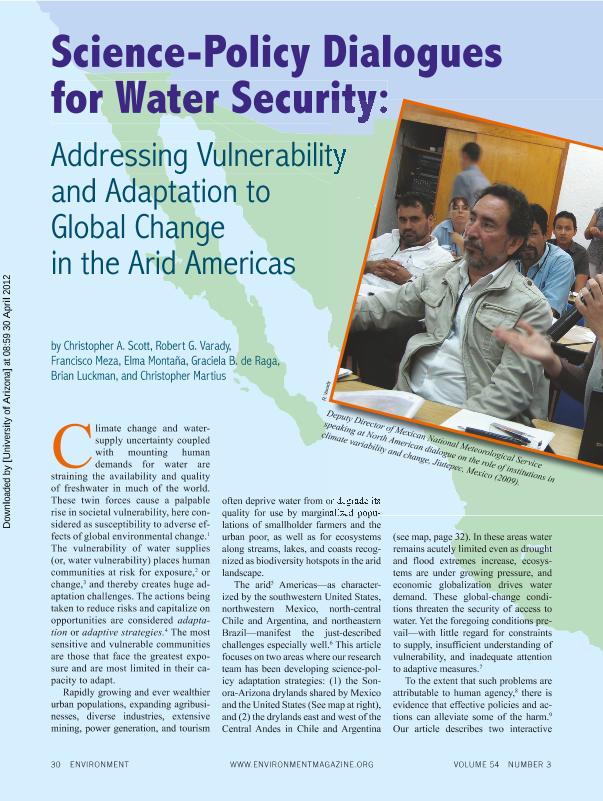Mostrar el registro sencillo del ítem
dc.contributor.author
Scott, Christopher A.
dc.contributor.author
Varady, Robert G.
dc.contributor.author
Meza, Francisco
dc.contributor.author
Montaña, Elma Carmen

dc.contributor.author
De Raga, Graciela B.
dc.contributor.author
Luckman, Brian
dc.contributor.author
Martius, Christopher
dc.date.available
2019-02-11T20:41:37Z
dc.date.issued
2012-04
dc.identifier.citation
Scott, Christopher A.; Varady, Robert G.; Meza, Francisco; Montaña, Elma Carmen; De Raga, Graciela B.; et al.; Science-policy dialogues for water security: Addressing vulnerability and adaptation to global change in the arid Americas; Taylor & Francis; Environment; 54; 3; 4-2012; 30-42
dc.identifier.issn
0013-9157
dc.identifier.uri
http://hdl.handle.net/11336/69930
dc.description.abstract
In much of the world, climate change is causing water supply to be increasingly uncertain while mounting human pressure is straining the availability of water, other resources, and ecosystem services. One result of these twin forces is a palpable rise in societal vulnerability. The arid Americas" as characterized by the Southwest United States, Northwest Mexico, North-central Chile and Argentina, and Northeast Brazil" manifest the above challenges especially well. In these areas water remains acutely limited, ecosystems are under growing pressure, and economic globalization drives water demand. These global change conditions threaten the security of access to water. Yet the foregoing conditions prevail?with little regard for constraints to supply, insufficient understanding of vulnerability, and inadequate attention to adaptive measures. To the extent that such problems are attributable to human agency, there is evidence that effective policies and actions can alleviate some of the harm. Among the policy instruments available, the formation and activation of interactive networks of scientists, agency personnel, civil society, and decisionmakers is an important and innovative strategy. Our essay describes two such networks, at different stages of development, in the arid Americas that have helped catalyze a sustained effort to reduce vulnerability and heighten adaptation to global change through science-policy dialogues in their respective regions.
dc.format
application/pdf
dc.language.iso
eng
dc.publisher
Taylor & Francis

dc.rights
info:eu-repo/semantics/openAccess
dc.rights.uri
https://creativecommons.org/licenses/by-nc-sa/2.5/ar/
dc.subject
Science-Policy Dialogues
dc.subject
Water Security
dc.subject
Vulnerability
dc.subject
Adaptation
dc.subject.classification
Otras Ciencias Sociales

dc.subject.classification
Otras Ciencias Sociales

dc.subject.classification
CIENCIAS SOCIALES

dc.title
Science-policy dialogues for water security: Addressing vulnerability and adaptation to global change in the arid Americas
dc.type
info:eu-repo/semantics/article
dc.type
info:ar-repo/semantics/artículo
dc.type
info:eu-repo/semantics/publishedVersion
dc.date.updated
2019-01-23T18:51:43Z
dc.journal.volume
54
dc.journal.number
3
dc.journal.pagination
30-42
dc.journal.pais
Reino Unido

dc.description.fil
Fil: Scott, Christopher A.. University of Arizona; Estados Unidos
dc.description.fil
Fil: Varady, Robert G.. University of Arizona; Estados Unidos
dc.description.fil
Fil: Meza, Francisco. Universidad Católica de Chile; Chile
dc.description.fil
Fil: Montaña, Elma Carmen. Universidad Nacional de Cuyo; Argentina
dc.description.fil
Fil: De Raga, Graciela B.. Universidad Nacional Autónoma de México; México
dc.description.fil
Fil: Luckman, Brian. University of Western Ontario; Canadá
dc.description.fil
Fil: Martius, Christopher. No especifica;
dc.journal.title
Environment

dc.relation.alternativeid
info:eu-repo/semantics/altIdentifier/url/https://www.tandfonline.com/doi/abs/10.1080/00139157.2012.673454
dc.relation.alternativeid
info:eu-repo/semantics/altIdentifier/doi/http://dx.doi.org/10.1080/00139157.2012.673454
Archivos asociados
